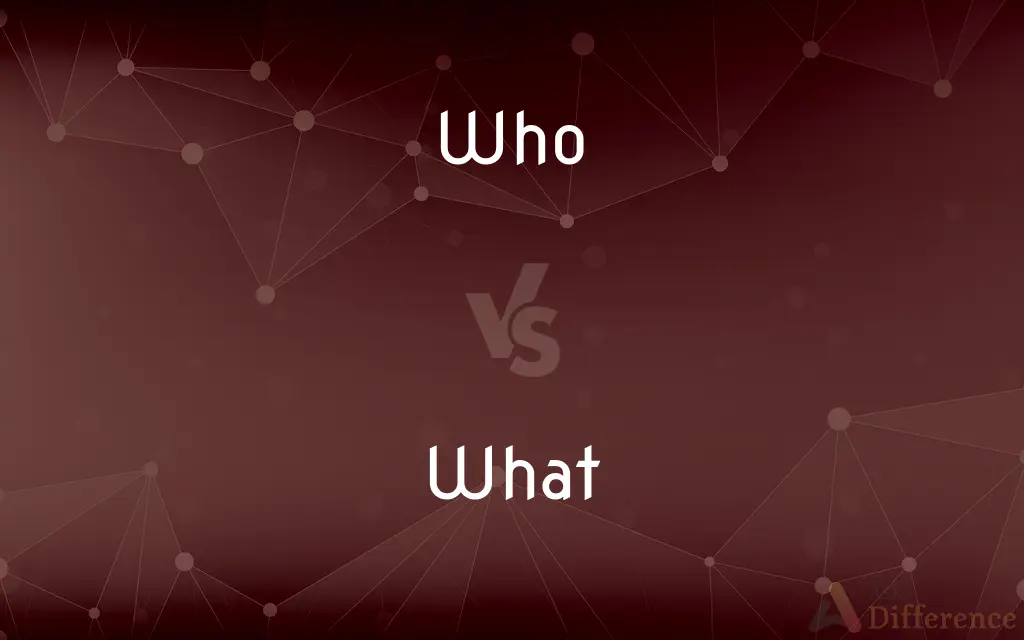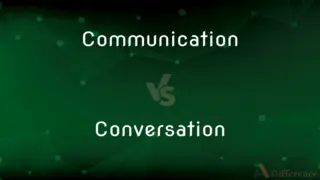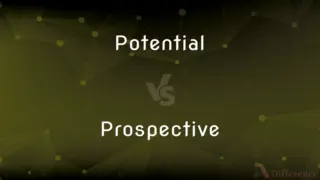Who vs. What — What's the Difference?
By Tayyaba Rehman — Updated on October 31, 2023
"Who" refers to a person or people, asking for identity or person-specific information. "What" refers to things, objects, or concepts, asking about the nature or name of something.

Difference Between Who and What
Table of Contents
ADVERTISEMENT
Key Differences
"Who" is used to ask about or refer to people. It focuses on the identity of individuals or groups. "What," on the other hand, is broader, referring to objects, ideas, or activities. It is concerned with things rather than people. For example, asking "Who is your doctor?" focuses on a person, while "What do you need?" could refer to any item or piece of information.
"Who" can specify a subject or an object in a sentence, always in relation to people. "What" can also specify a subject or an object but is never used to directly refer to people. "Who made the call?" seeks information about a person, whereas "What was called?" inquires about the nature of something, perhaps an event or a concept.
In usage, "who" is personal and "what" is impersonal. "Who" gives a sense of personification, directly or indirectly involving human characteristics. "What" is used in a broader range of contexts, applicable to inanimate objects, abstract concepts, or categorizing a person's role rather than their identity, as in "What is a firefighter?"
"Who" and "what" serve different grammatical purposes. "Who" can be subjective (who loves chocolate?) or objective (whom do you love?), while "what" does not change form. Additionally, "who" relates to the concept of personhood, often triggering a search for a name or role, and "what" seeks to identify non-human details.
Comparison Chart
Refers to
People
Objects, ideas, activities
ADVERTISEMENT
Nature
Personal
Impersonal
Grammatical Role
Subject or object pertaining to people
Subject or object pertaining to things or concepts
Usage in Questions
Identity or relation of individuals
Nature or description of things or situations
Example
Who are you?
What is this?
Compare with Definitions
Who
Used to ask about the identity of a person.
Who is at the door?
What
Refers to specifying a thing or things.
What book are you reading?
Who
Refers to someone known or specified.
Who can drive a manual car here?
What
Asks for a repetition or clarification.
You did what by accident?
Who
Inquiries about the character or role of a person.
Who is the best candidate for this job?
What
Indicates surprise or disbelief about something.
What! You’ve never seen snow?
Who
Used to add emphasis to a question about a person.
Just who do you think you are?
What
Asking for information specifying something
What is your name?
I'm not sure what you mean
Who
What or which person or people
I wonder who that letter was from
Who is that woman?
What
The thing or things that (used in specifying something)
What we need is a commitment
Who
Used to introduce a clause giving further information about a person or people previously mentioned
Joan Fontaine plays the mouse who married the playboy
What
(in exclamations) emphasizing something surprising or remarkable
What some people do for a crust!
Who
(interrogative) What person or people; which person or people; asks for the identity of someone; used in a direct or indirect question.
Who is that? (direct question)
I don't know who it is. (indirect question)
What
Asking for information specifying something
Do you know what excuse he gave?
What time is it?
Who
(relative) Introduces a relative clause having a human antecedent.
What
(referring to the whole of an amount) whatever
He had been robbed of what little money he had
Who
With antecedent as subject.
That's the man who works at the newsagent. (defining)
My sister, who works in the accounts department, just got promoted to manager. (non-defining)
What
(in exclamations) how great or remarkable
What a fool she was
What luck!
Who
(non-formal) With antecedent as object: whom.
What
To what extent?
What does it matter?
Who
Whoever, he who, they who.
Who insults my mother insults me.
What
Used to indicate an estimate or approximation
See you, what, about four?
Who
A person under discussion; a question of which person.
What
Used for emphasis or to invite agreement
Pretty poor show, what?
Who
Whose
Who phone just rang?
What
Which one or ones of several or many
What college are you attending? You should know what musical that song is from.
Who
One; any; one.
As who should say, it were a very dangerous matter if a man in any point should be found wiser than his forefathers were.
What
Whatever
They soon repaired what damage had been done.
Who
A United Nations agency to coordinate international health activities and to help governments improve health services
What
How great; how astonishing
What a fool!.
Who
Indicates which person or people.
Who wants ice cream?
What
How much; in what respect; how
What does it matter?.
What
That
I don't know but what I'll go.
What
Used to express surprise, incredulity, or other strong and sudden excitement.
What
Chiefly British Used as a tag question, often to solicit agreement.
What
(interrogative) Which, especially which of an open-ended set of possibilities.
What colour are you going to use?
What time is it?
What kind of car is that?
What
(relative) Which; the ... that.
I know what colour I am going to use.
That depends on what answer is received.
What
(relative) Any ... that; all ... that; whatever.
He seems to have lost what sense he had.
What money I earn is soon spent.
What
Emphasises that something is noteworthy or remarkable in quality or degree, in either a good or bad way; may be used in combination with certain other determiners, especially 'a', less often 'some'.
This shows what beauty there is in nature.
You know what nonsense she talks.
I found out what a liar he is.
What
Used to form exclamations.
What nonsense!
Wow! What a speech.
What some lovely weather we've been having!
What beautiful children you have.
With what passion she sings!
What
(interrogative) Which thing, event, circumstance, etc.: used in asking for the specification of an identity, quantity, quality, etc.
What is your name?
Ask them what they want.
What
(fused relative) That which; those that; the thing(s) that.
He knows what he wants.
What is amazing is his boundless energy.
And, what's even worse, I have to work on Sunday too.
What
(fused relative) Anything that; all that; whatever.
I will do what I can to help you.
What is mine is yours.
What
That; which; who.
'Ere! There's that bloke what I saw earlier!
What
(interrogative) In what way; to what extent.
What does it matter?
What do you care?
What
Used before a prepositional phrase to emphasise that something is taken into consideration as a cause or reason; usually used in combination with 'with' (see what with), and much less commonly with other prepositions.
What
An expression of surprise or disbelief.
What! That’s amazing!
What
What do you want? An abrupt, usually unfriendly enquiry as to what a person desires.
What? I'm busy.
What
Clipping of what do you say? Used as a type of tag question to emphasise a statement and invite agreement, often rhetorically.
It’s a nice day, what?
What
What did you say? I beg your pardon?
— Could I have some of those aarrrrrr mmmm ...
— What?
— What?
What
Indicating a guess or approximation, or a pause to try to recall information.
I must have been, what, about five years old.
What
Something; thing; stuff.
What
(countable) The identity of a thing, as an answer to a question of what.
What
(countable) Something that is addressed by what, as opposed to a person, addressed by who.
What
As an interrogative pronoun, used in asking questions regarding either persons or things; as, what is this? what did you say? what poem is this? what child is lost?
What see'st thou in the ground?
What is man, that thou art mindful of him?
What manner of man is this, that even the winds and the sea obey him!
What
As an exclamatory word: - (a) Used absolutely or independently; - often with a question following.
What, could ye not watch with me one hour?
What
Used adjectively, meaning how remarkable, or how great; as, what folly! what eloquence! what courage!
What a piece of work is man!
O what a riddle of absurdity!
What
As a relative pronoun
What
Sometimes prefixed to adjectives in an adverbial sense, as nearly equivalent to how; as, what happy boys!
What partial judges are our love and hate!
What
Used substantively with the antecedent suppressed, equivalent to that which, or those [persons] who, or those [things] which; - called a compound relative.
With joy beyond what victory bestows.
I'm thinking Captain Lawton will count the noses of what are left before they see their whaleboats.
What followed was in perfect harmony with this beginning.
I know well . . . how little you will be disposed to criticise what comes to you from me.
What
Whatever; whatsoever; what thing soever; - used indefinitely.
Whether it were the shortness of his foresight, the strength of his will, . . . or what it was.
What
Used adjectively, equivalent to the . . . which; the sort or kind of . . . which; rarely, the . . . on, or at, which.
See what natures accompany what colors.
To restrain what power either the devil or any earthly enemy hath to work us woe.
We know what master laid thy keel,What workmen wrought thy ribs of steel.
What
Used adverbially, in part; partly; somewhat; - with a following preposition, especially, with, and commonly with repetition.
What for lust [pleasure] and what for lore.
Thus, what with the war, what with the sweat, what with the gallows, and what with poverty, I am custom shrunk.
The year before he had so used the matter that what by force, what by policy, he had taken from the Christians above thirty small castles.
What time the morn mysterious visions brings.
What
Used adverbially in a sense corresponding to the adjectival use; as, he picked what good fruit he saw.
What
Why? For what purpose? On what account?
What should I tell the answer of the knight.
But what do I stand reckoning upon advantages and gains lost by the misrule and turbulency of the prelates? What do I pick up so thriftily their scatterings and diminishings of the meaner subject?
What
Something; thing; stuff.
And gave him for to feed,Such homely what as serves the simple lown.
What
Used to ask for information specifying something.
What is your favorite color?
What
Inquiries about the nature or identity of an object or idea.
What is democracy?
Common Curiosities
Is there a plural form for "who"?
"Who" does not change in plural form.
Do "who" and "what" always start questions?
They often start questions but can also be used in clauses, e.g., "I wonder who/what..."
Can "what" be used to ask for definitions?
Yes, as in "What does 'freedom' mean?"
Can "what" introduce a statement?
Yes, as in "What I need is a vacation."
Can "what" refer to activities?
Yes, you can ask, "What are you doing?"
Is "who" used in legal contexts?
Yes, to identify persons in legal documents or discussions.
How do "who" and "what" function in a sentence?
Both can act as subjects or objects, depending on the structure.
Does "who" have an objective form?
Yes, "whom" is the objective form, though less commonly used.
Can "who" and "what" be used interchangeably?
No, "who" refers to people, "what" to objects or concepts.
Is "who" used only for individuals?
"Who" can refer to individuals or groups of people.
Can "what" ever refer to a person?
Yes, when asking about a person's role or occupation, e.g., "What is he by profession?"
Can "what" be used to express exasperation?
Yes, e.g., "What now!"
Are there any contractions with "who"?
Yes, "who's" for "who is" or "who has."
Are there any compound forms of "who"?
Yes, such as "whoever" or "whosoever."
Do "who" and "what" have equivalent forms in all languages?
Not exactly, as question words vary by language and grammatical structure.
Share Your Discovery

Previous Comparison
Communication vs. Conversation
Next Comparison
Potential vs. ProspectiveAuthor Spotlight
Written by
Tayyaba RehmanTayyaba Rehman is a distinguished writer, currently serving as a primary contributor to askdifference.com. As a researcher in semantics and etymology, Tayyaba's passion for the complexity of languages and their distinctions has found a perfect home on the platform. Tayyaba delves into the intricacies of language, distinguishing between commonly confused words and phrases, thereby providing clarity for readers worldwide.














































